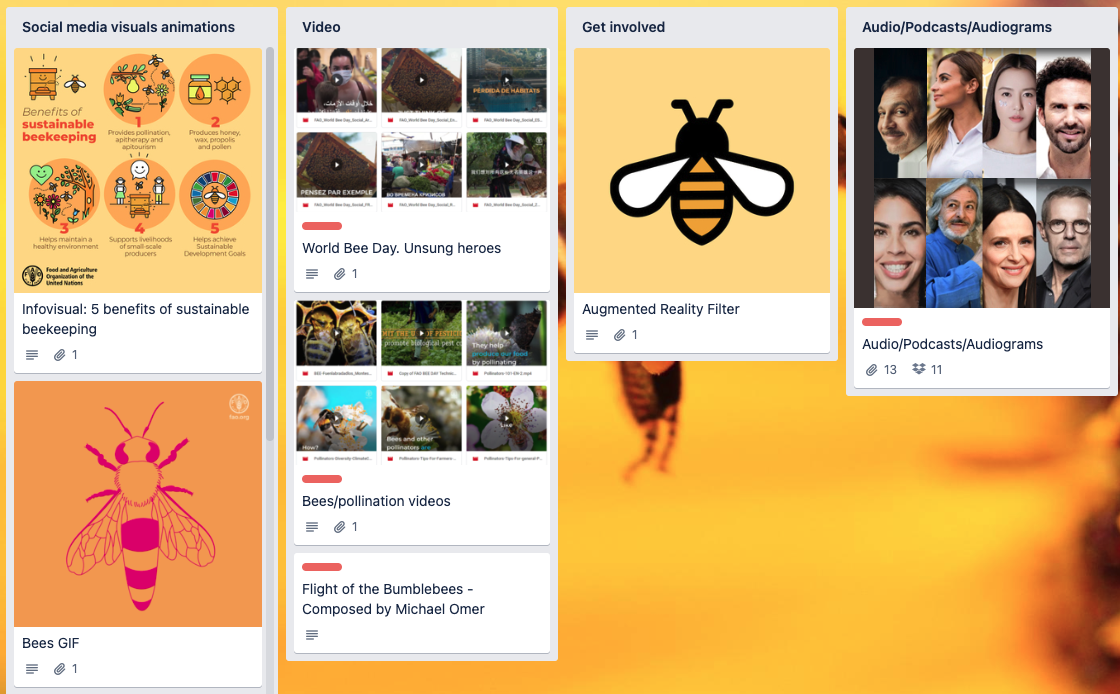Why a World Bee Day?
By observing World Bee Day each year, we can raise awareness on the essential role bees and other pollinators play in keeping people and the planet healthy, and on the many challenges they face today. We have been celebrating this day since 2018, thanks to the efforts of the Government of Slovenia with the support of Apimondia, that led the UN General Assembly to declare 20 May as World Bee Day.
The date for this observance was chosen as it was the day Anton Janša, a pioneer of modern apiculture, was born. Janša came from a family of beekeepers in Slovenia, where beekeeping is an important agricultural activity with a long-standing tradition.
Today bees, pollinators, and many other insects are declining in abundance. This day provides an opportunity for all of us – whether we work for governments, organizations or civil society or are concerned citizens – to promote actions that will protect and enhance pollinators and their habitats, improve their abundance and diversity, and support the sustainable development of beekeeping.
Bee inspired by nature to nourish us all
 This year's theme, "Bee inspired by nature to nourish us all", highlights the critical roles bees and other pollinators play in agrifood systems and the health of our planet's ecosystems. Indeed, pollinators are increasingly threatened by habitat loss, unsustainable agricultural practices, climate change and pollution. Their decline jeopardizes food production, increases costs and exacerbates food insecurity, particularly for rural communities.
This year's theme, "Bee inspired by nature to nourish us all", highlights the critical roles bees and other pollinators play in agrifood systems and the health of our planet's ecosystems. Indeed, pollinators are increasingly threatened by habitat loss, unsustainable agricultural practices, climate change and pollution. Their decline jeopardizes food production, increases costs and exacerbates food insecurity, particularly for rural communities.
Pollination is essential for agrifood systems, supporting the production of more than 75 percent of the world's crops, including fruits, vegetables, nuts and seeds. In addition to increasing crop yields, pollinators improve food quality and diversity.
More than 200 000 animal species are pollinators, the vast majority of which are wild, including butterflies, birds, bats and more than 20 000 bee species.
Bees and other pollinators also serve as indicators of environmental health, providing insights into ecosystems and the climate. Protecting pollinators also enhances biodiversity and critical ecosystem services, such as soil fertility, pest control, and air and water regulation.
Nature-friendly agricultural practices like agroecology, intercropping, agroforestry, and integrated pest management help sustain pollinators, ensuring stable crop yields and reducing food shortages and environmental impacts.
Deliberate pollinator protection efforts ultimately foster the conservation of other components of biodiversity, which enhances ecosystem services like pest control, soil fertility and air and water regulation. Adopting a holistic approach that ensures the long-term co-existence of agricultural practices for the production of food, fibre and fuel is needed for sustainable agrifood systems.
There is something all of us can do to safeguard the future of pollinators.
Did you know?
You don't have to be a beekeeper to protect bees and other pollinators. Here are some easy alternatives:
By taking these simple actions, you will help to protect and enhance bees and other essential pollinators in our ecosystem. Bee Aware.
What's the buzz about?
But did you know that they also provide us with medicines and even help keep our planet beautiful and healthy?
Take our bee quiz and learn more about these tiny food heroes!
Learn more
Highlights

Stories
Read FAO success stories from around the world on how bees and beekeeping contribute to livelihoods and sustainable development.

Publications
Browse this selection of FAO publications offering guidance, tools and analysis on bees and other pollinators.

Infographics
Check out this series of infographics on honey, pollinators, beehive products, benefits of pollinators, and the pollination services of forests.
Timeline leading to World Bee Day
| 20 May 1734 – Breznica, Slovenia Birth of Anton Janša, who came from a long line of beekeepers, became a pioneer of modern apiculture. Bees were a frequent topic of conversation with neighbouring farmers, who would gather at the village and discuss farming and bee-keeping practices. 1766 – Anton enrolled in the first bee-keeping school in Europe. 1769 – Janša worked fulltime as a beekeeper. 1771 – Published the book Discussion on Bee-keeping in German. 2016 – At the FAO Regional Conference for Europe, the Republic of Slovenia proposed World Bee Day to be celebrated on 20 May each year, with the support of Apimondia, the International Federation of Beekeepers’ Association. 2017 – Proposal for World Bee Day was submitted for consideration at the 40th Session of FAO Conference. 2017 – UN General Assembly unanimously proclaimed 20 May as World Bee Day. 20 May 2018 – First Observance of World Bee Day. |
Related links
Get involved!
Find out more about how you can promote #WorldBeeDay by reading the Get Involved Guide.
 Get Involved Guide
Get Involved Guide
Watch
Let’s all celebrate the World Bee Day
19/05/2025
In this video, Yurdi Yasmi, Director of the FAO Plant Production and Protection Division, invites us to recognize the .....
Spread the word!
Inform, educate and engage audiences with real facts. Join the #WorldBeeDay campaign by sharing our free material on digital channels and raise awareness about the need to protect bees and other pollinators.
 Trello Board
Trello Board Communication Materials
Communication Materials
Worldwide events

2nd International forum for action on sustainable beekeeping and pollination
20 - 22 May 2025, Jimma, Ethiopia
With the support of
 Find out more
Find out more













